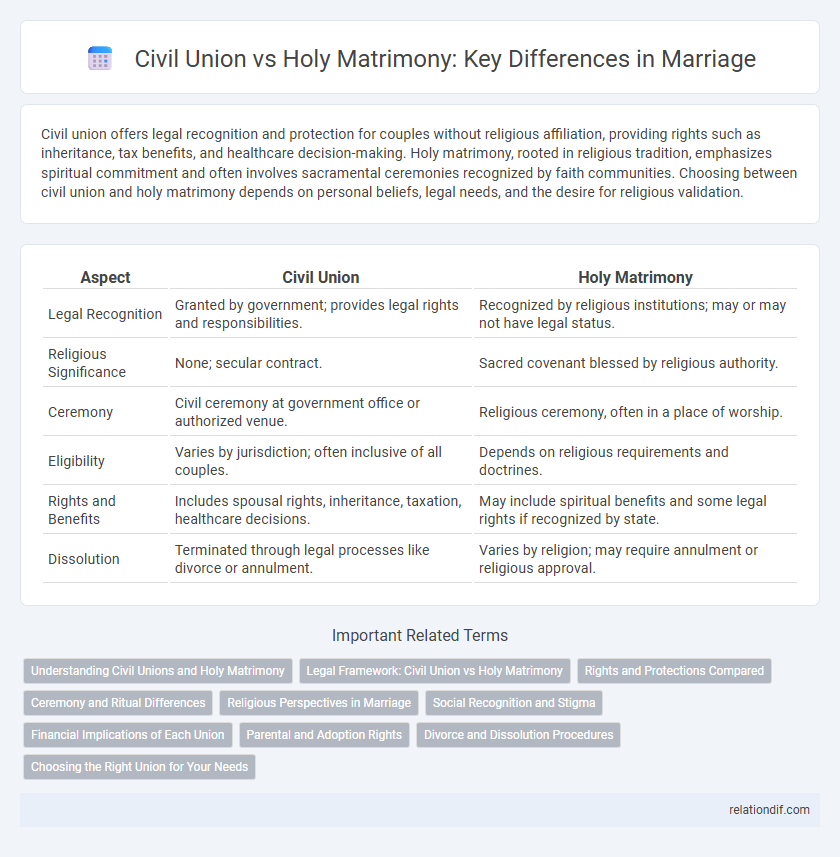Civil union offers legal recognition and protection for couples without religious affiliation, providing rights such as inheritance, tax benefits, and healthcare decision-making. Holy matrimony, rooted in religious tradition, emphasizes spiritual commitment and often involves sacramental ceremonies recognized by faith communities. Choosing between civil union and holy matrimony depends on personal beliefs, legal needs, and the desire for religious validation.
Table of Comparison
| Aspect | Civil Union | Holy Matrimony |
|---|---|---|
| Legal Recognition | Granted by government; provides legal rights and responsibilities. | Recognized by religious institutions; may or may not have legal status. |
| Religious Significance | None; secular contract. | Sacred covenant blessed by religious authority. |
| Ceremony | Civil ceremony at government office or authorized venue. | Religious ceremony, often in a place of worship. |
| Eligibility | Varies by jurisdiction; often inclusive of all couples. | Depends on religious requirements and doctrines. |
| Rights and Benefits | Includes spousal rights, inheritance, taxation, healthcare decisions. | May include spiritual benefits and some legal rights if recognized by state. |
| Dissolution | Terminated through legal processes like divorce or annulment. | Varies by religion; may require annulment or religious approval. |
Understanding Civil Unions and Holy Matrimony
Civil unions provide legal recognition and rights to couples, often including property, inheritance, and healthcare decision-making, without religious ceremonies or affiliations. Holy matrimony is a religious sacrament that binds partners through spiritual vows, often accompanied by traditional rituals and upheld by faith-based institutions. Understanding the distinctions helps couples choose the union type that aligns with their legal needs and personal beliefs.
Legal Framework: Civil Union vs Holy Matrimony
Civil union and holy matrimony differ primarily in their legal framework; civil unions are governed by state laws and provide legal rights and responsibilities similar to marriage without religious recognition. Holy matrimony is a religious sacrament recognized by religious institutions and, when registered with the state, also grants legal status and protections under family law. Legal benefits such as tax filing, inheritance rights, and healthcare decision-making often depend on the type of union and jurisdiction, influencing the choice between civil union and holy matrimony.
Rights and Protections Compared
Civil union grants couples legal rights similar to marriage, including property ownership, inheritance, and healthcare decision-making, but these rights vary by jurisdiction and may lack federal recognition. Holy matrimony, recognized both legally and religiously, often provides comprehensive protections such as spousal benefits, tax advantages, and social acknowledgment, reinforced by religious customs. Couples in civil unions may face limitations in adoption rights and spousal immigration, whereas holy matrimony typically ensures broader access to these protections.
Ceremony and Ritual Differences
Civil union ceremonies are typically secular and conducted by government officials or authorized celebrants, emphasizing legal recognition and contractual commitments without religious elements. Holy matrimony rituals vary across faiths but generally include sacred vows, blessings, and traditional rites performed by clergy or spiritual leaders, highlighting the spiritual and communal significance of marriage. While civil unions focus on legal rights and responsibilities, holy matrimony ceremonies often incorporate symbolic acts that reinforce religious beliefs and cultural heritage.
Religious Perspectives in Marriage
Religious perspectives on marriage often emphasize holy matrimony as a sacred covenant sanctioned by divine authority, reflecting spiritual unity and lifelong commitment. Civil unions, while legally recognized, typically lack explicit religious significance and are viewed by many faith traditions as insufficient replacements for sacramental marriage. The theological importance placed on holy matrimony stems from scriptural teachings and doctrinal interpretations that uphold marriage as a divine institution beyond legal frameworks.
Social Recognition and Stigma
Civil unions often provide legal rights similar to holy matrimony but may lack widespread social recognition, causing couples to face stigma in more traditional communities. Holy matrimony benefits from centuries of cultural acceptance, enhancing social status and minimizing societal judgment. The disparity in recognition between civil unions and holy matrimony continues to influence the level of social validation and exclusion experienced by couples.
Financial Implications of Each Union
Civil unions often provide limited financial benefits compared to holy matrimony, with fewer tax advantages and restrictions on spousal social security or pension benefits. Holy matrimony grants comprehensive legal rights, including joint tax filing, inheritance rights, and access to a spouse's health insurance and survivor benefits. Financial planning and asset protection tend to be more robust under marriage due to established federal and state laws supporting spousal entitlements.
Parental and Adoption Rights
Civil unions provide couples with many parental and adoption rights similar to those granted in holy matrimony, including joint adoption and legal recognition as co-parents. However, holy matrimony often holds stronger societal and legal weight in certain jurisdictions, influencing parental rights, especially in custody and inheritance matters. Couples in civil unions should verify their state's specific laws to ensure their parental rights and adoption processes are fully protected.
Divorce and Dissolution Procedures
Divorce in civil unions typically follows standardized legal procedures governed by state laws, allowing for straightforward dissolution with clear guidelines on asset division and custody arrangements. Holy matrimony, while legally recognized, often involves additional religious protocols that can complicate the separation process, such as annulments or ecclesiastical approvals. Legal dissolution of civil unions tends to be more secular and efficient, whereas ending a holy matrimony may require navigating both civil courts and religious institutions.
Choosing the Right Union for Your Needs
Choosing between civil union and holy matrimony depends on individual values, legal implications, and personal beliefs. Civil unions provide legal recognition and rights similar to marriage without religious connotations, appealing to couples seeking secular commitment. Holy matrimony offers spiritual significance and is often preferred by those valuing religious traditions and community recognition.
civil union vs holy matrimony Infographic

 relationdif.com
relationdif.com